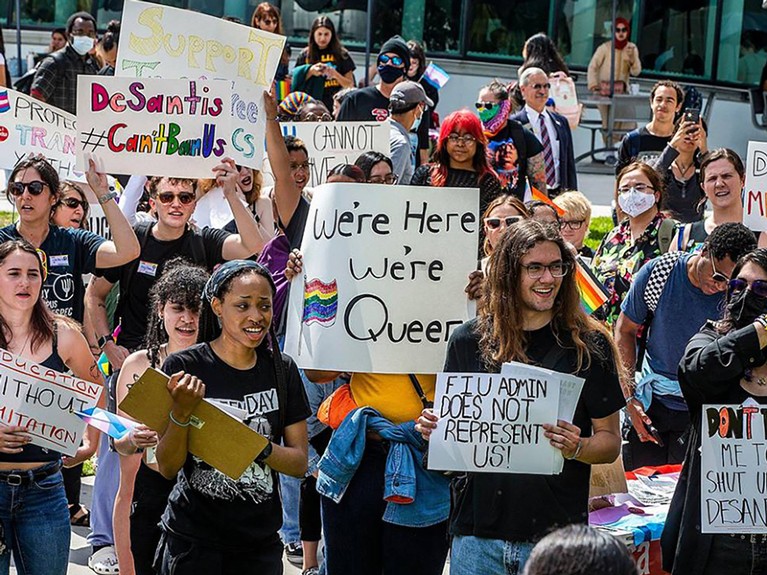
Academic staff and students in Florida protest at plans to defund diversity initiatives at the state’s public universities.Credit: Pedro Portal/Miami Herald/Tribune News Service/Getty
A Florida bill that proposes to slash funding for diversity, equity and inclusion (DEI) initiatives in higher education and ban race- and gender-studies programmes has raised concerns that other conservative US states will follow suit.
House Bill 999, which was introduced into the Florida state legislature on 21 February, also threatens to concentrate hiring power in the hands of each public university’s 13-member board of trustees, made up of political appointees — rather than faculty members.
The bill also allows post-tenure review at any time, mirroring similar proposed legislation in Texas, and is part of sweeping academic reforms sought by Florida’s Republican governor Ron DeSantis. In April 2022, DeSantis signed the state’s ‘Stop WOKE (Wrongs to our Kids and Employees) Act’, which puts restrictions on teaching anything that would cause anyone to “feel guilt, anguish, or other forms of psychological distress” owing to their race, colour, sex or national origin.
Decolonizing science toolkit
“We will be the first state in these United States to wipe out DEI in our public universities,” DeSantis said last month. The governor contends that DEI funding is not a good use of public money. A January 2023 audit of the University of Florida in Gainsville revealed that US$5.3 million, or 0.14% of its total projected budget for 2022–23, was to be spent on DEI.
Texas governor Greg Abbott is closely following the DeSantis playbook. On 13 February, Texas announced that bills to ban critical race theory in higher-education curricula, ban DEI policies and eliminate tenure at academic institutions were among the state government’s top priorities. Earlier that month, Abbott warned leaders of public universities that the use of DEI initiatives in hiring is illegal.
“When you see elected leaders demonizing educators and weaponizing education, it’s a five-alarm fire for democracy,” says Irene Mulvey, president of the American Association of University Professors (AAUP) in Washington DC. “It important to understand that when governors attack DEI efforts, they completely mischaracterize them to create a straw-man demon that they now have to do away with,” she adds.
Nature’s requests to speak to officials at the University of Florida, Florida State University in Tallahassee, Texas Tech University in Lubbock, Texas A&M University in College Station and the University of Texas at Austin were declined or ignored. Yet several faculty members, speaking anonymously, say they have considered looking for positions in other states.
“What happens in Florida has national impacts for the quality of higher education,” says Emilio Bruna, a tropical ecologist at the University of Florida and former director of its Florida–Brazil Linkage Institute. He describes the state as a testing ground. “It’s going to spread. What happens in Florida does not stay in Florida.”
State-government officials in Republican-controlled Oklahoma and South Carolina have compiled reports of expenditures related to DEI in recent years. The Oklahoma report found that DEI would receive the equivalent of 0.11% of state higher-education spending this year. South Carolina has yet to make public its findings, but on 23 February, the board of governors of the University of North Carolina System voted to no longer require DEI statements as part of applications by prospective faculty members or students.
Leaching talent
Florida and Texas each have two institutions in the list of the top ten US universities by number of undergraduates, according to the U.S. News & World Report 2022 ranking, based on 2021 data — the University of Central Florida in Orlando, Texas A&M University, Florida International University in Miami and the University of Texas at Austin. The University of Florida is also listed as one of the top five US public universities.
“The university rose in ranking following the 2018 strategic five-year plan that focused on DEI, which is about inclusive excellence,” says Amanda Phalin, University of Florida faculty senate chair and a trustee. She fears its ranking will be at risk if majors or programmes can’t get accredited, the university can’t attract top talent or federal funds can’t be secured.
“We have lost faculty, either to poaching or they decided to leave,” says Bruna. “I know of at least one faculty search where an invited candidate declined, citing the current situation in Florida.” The Florida bill suggests that no faculty members at public universities would be permitted to use federal grant funding for DEI initiatives. Phalin estimates that Florida universities could be excluded from tens of millions of dollars in federal research grants at the very least. The bill is written so vaguely, adds Bruna, that faculty members are unclear as to whether they should spend the time to apply for such grants — especially given the lack of communication from university administrators. “It’s the information void that people are finding so frustrating and challenging,” says Bruna. “In my 21 years here, I’ve never seen morale this low.”
Collection: Diversity and scientific careers
A social psychologist at a public university in Texas, who requested anonymity to protect her career, asks: “If a university is perceived as a hostile or unwelcoming environment, why would anyone [from a marginalized background] apply to go to college or grad school at that institution?”
The psychologist mentioned the Michigan Civil Rights Initiative, a state law passed in 2006 banning public institutions from giving preferential treatment to groups or individuals on the basis of their race, gender, colour, ethnicity or national origin.
In the 16 years that followed the bill’s adoption, the proportion of Black students at the university decreased from 7% to 4.5% and the percentage of Native American students dropped from 1% to 0.16%, according to the institution’s data.
Defiance
A Hispanic faculty member in the biomedical sciences at the University of Florida, who prefers to be anonymous to protect her career advancement, says that she and many fellow scientists are persisting with DEI efforts. “I’m going to continue until someone tells me to stop,” she says. The DeSantis policies and rhetoric have triggered a resistance movement. “We are going to stay here and fight,” she says. “If we all leave, all of our efforts before were for nothing.”
On 23 February, hundreds of students across Florida public universities walked out of classrooms to oppose anti-DEI efforts. These efforts included a memo, dated 11 January, from DeSantis that asked universities to provide the number and ages of students who had sought or received gender-affirming surgery or hormone prescriptions.
“Every single trans person I know has some sort of contingency plan” to leave Florida institutions, says Andy Pham, a fourth-year biomedical science undergraduate and a senior leader of the Trans+ Student Union at the University of South Florida in Tampa.
“It is my dream to provide gender-affirming healthcare, but I no longer wish to pursue a medical degree in Florida if practitioners in this field continue facing inflammatory rhetoric, legal uncertainty and government intimidation,” he says.
Asia Eaton, a social psychologist at Florida International University, says the actions of conservative administrations are a strategic and purposeful attack on science. “At the same time they are cutting DEI, they are undermining unions and decreasing protections on intellectual freedoms,” she says. “I don’t know what the alternative to equity and inclusivity is — exclusivity and racism? There is no reasonable alternative to creating culturally respon



